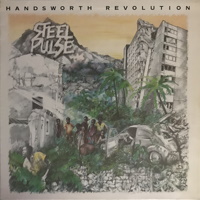|
Handsworth Revolution
Handsworth Revolution is the debut album by British reggae band Steel Pulse. It is named after the Handsworth district of Birmingham, England, the band's home district to which the album was dedicated. Handsworth Revolution peaked at No. 9 on the UK Pop Album charts and No. 34 on the Swedish Pop Album charts.[4][5] BackgroundThe first Steel Pulse single for Island Records, "Ku Klux Klan" (a call for resistance against forces of racism), was released in February 1978. Five months later, their debut album was released to critical acclaim. Handsworth Revolution was produced by Karl Pitterson, who had worked with Bob Marley, Bunny Wailer and Peter Tosh. The album reached #9 on the British charts ten days after its release. The band would soon support Bob Marley & The Wailers on a 12-date European tour in June and July 1978, including concerts in Paris, Ibiza, Gothenburg, Stockholm, Oslo, Rotterdam, Amsterdam and Brussels. The tour kicked off with an outdoor festival at the New Bingley Hall in Stafford. David Hinds recalls:
Steel Pulse headlined its own tour in 1978 and released two more singles from the album: "Prodigal Son" and "Prediction." Mykaell Riley left the band because of musical differences and went on to success with the Reggae Philharmonic Orchestra and as producer for a number of top artists and TV themes. His departure propelled Hinds into the spotlight and in an attempt to draw a stronger black audience,[citation needed] the group adopted the banner of the Rastafari movement. Appearances on television included mainstream shows like Top of the Pops and Rock Goes to College. At one of their 'Rock Against Racism' appearances, in Victoria Park, East London in April 1978, more than 80,000 people watched a concert that also included The Clash, Tom Robinson Band and X-Ray Spex. A live performance of the track "Macka Splaff" appeared on a 1978 Virgin Records compilation album called Live at the Electric Circus, alongside offerings by The Fall, Joy Division, Buzzcocks and John Cooper Clarke. Two of their tracks were also included in the film Reggae in Babylon that documented the reggae movement in the UK in 1978, alongside Aswad, Matumbi, Jimmy Lindsay and Alton Ellis. Track listingAll songs written by David Hinds except as shown.
Personnel
References
|
|||||||||||||||||||||||||||||||||||
